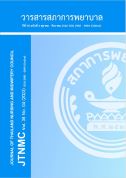Effectiveness of a Participatory Learning for Covid-19 Prevention Program in School-aged Muslim Students
DOI:
https://doi.org/10.60099/jtnmc.v38i04.264508Keywords:
participatory learning program, COVID-19 prevention, school-aged children, Muslim studentsAbstract
Introduction The COVID-19 pandemic has had health impacts on the community members, particularly in school-aged Muslim students. Promoting participatory learning is vital to preventing COVID-19.
Objectives 1) To compare COVID-19 prevention awareness, COVID-19 prevention knowledge, and COVID-19 prevention behaviors in school-aged Muslim students in the experimental group before and after the program, and 2) to compare COVID-19 prevention awareness, COVID-19 prevention knowledge, and COVID-19 prevention behavior in school-aged Muslim students between the experimental and comparison groups after the program.
Design A quasi-experimental study with a two-group pretest and posttest design, applying Kolb’s experiential learning theory as the conceptual framework
Methodology The sample comprised school-aged Muslim students in a central province. Two schools were randomly assigned to the experimental and comparison groups. Subsequently, 37 students in the experimental group and 38 students in the comparison group were allocated based on their respective schools. The control group participated in a 6-week participatory learning program for COVID-19 prevention, structured in four stages: 1) sharing experiences, 2) reflection and discussion, 3) conceptualization, and 4) experimentation and concept application. Data collection instruments consisted of three questionnaires: 1) COVID-19 Prevention Awareness, 2) COVID-19 Prevention Knowledge, and 3) COVID-19 Prevention Behavior. The questionnaires revealed reliability of .91, .89, and .94, respectively. Data were analyzed using descriptive statistics, Independent t-test, and Paired t-test.
Results After participating in the program, the experimental group had COVID- 19 prevention awareness (M = 3.17, SD = 0.43), knowledge (M = 22.30, SD = 3.88), and behavior (M = 3.43, SD = 0.59) higher than before the program (M = 3.10, SD = 0.32, t = 0.524, p = .026; M = 21.59, SD = 3.50, t = 5.376, p = .003; M = 2.92, SD = 0.51, t = 5.376, p < .001, respectively) and higher than the comparison group with statistical significance (M = 3.16, SD = 0.25, t = 7.316, p = .035; M = 21.13, SD = 3.12, t = 7.316, p < .001; M = 2.91, SD = 0.54, t = 7.316, p < .001, respectively). However, knowledge about infectious disease outbreaks and self-care behavior to prevent infection with COVID- 19 had no statistically significant difference from before the program.
Recommendation Health team and other stakeholders can apply participatory learning programs to promote awareness, knowledge, and behavior for COVID-19 prevention in Muslim school-aged children.
Downloads
References
Yuki K,Fujiogi M, Koutsogiannaki S. COVID-19 pathophysiology: A review. Clin Immuno 2020;215: 108427. [cited 2023 Apr 26]. Available from https://www.ncbi.nlm.nih.gov/pmc/articles/PMC7169933/
Sujaritrak W. Interesting facts about the SARSCoV-2 virus: the virus that causes COVID-19; 2021 [cited 2023 Apr 29]. Available from: https://pidst.or.th/A966.html
Adamjaroen B., Iamsawatdikun W. Relationship between health literacy and COVID-19 preventive behaviors, in new normal era among working-age people in Bangkok Metropolitan and its suburbs. Nursing Journal 2021; 71(3): 27-35. (in Thai)
World Health Organization. Coronavirus disease (COVID-19) Situation Report–126. [cited 2020 May 25]. Available from: https://www.who.int/docs/de-faultsource/coronaviruse/situation-re-ports/20200525-covid-19-sitrep-126.pdf?s-fvrsn=887dbd66_2
Department of Disease Control. Department of Disease Control advises people to increase social distance “Social Distancing” with 8 methods to prevent COVID-19. 2020 [cited 2022 Feb 25]. Available from: 2023. https://ddc.moph.go.th/brc/news.php?news=12278&deptcode=brc. 23 Feb 2564. (in Thai)
Ministry of Public Health. Public Health. Practice Guidelines for Managing the COVID-19 Outbreak in the regulations issued under Section 9 of the Emergency Decree on Public Administration in Emergency Situations B.E. 2548 (No. 1): 2020. (in Thai)
Emergency Operations Center. Department of Health. Disease situation report, contact Coronavirus 2019, No.179, June 30, 2020. [Internet]. [cited 2022 May 25]. Available from: https://ddc.moph.go.th/viralpneumonia/file/situation/situation-no179-300663.pdf
Woolf S H,Chapman DA,Sabo RT,Weinberger DM,Hill L, Taylor DDH. Excess Deaths From COVID-19 and Other Causes, March-July 2020. JAMA 2020; 324(15):1562–64. doi:10.1001/jama.2020.19545
Kolb DA. Experiential learning: Experience as the source of learning and development. Englewood Cliffs, NY: Prentice Hall. 1984. Available from: https://learningfromexperience.com/images/uploads/process-of-experiential-learning.pd.
Chanthida S, Aungwattana S, Tuanrat W. Effect s of a learning enhancement program on COVID-19 prevention knowledge and practices of student leaders in Anukul Wittaya school, Mae Sot district, Tak province. Nursing Journal CMU 2023; 50(2): 227-37.
Koedphon P. The effect of the club learning activities arrangement to prevent the epidemics based on the child-to-child approach which influences knowledge and awareness on preparedness for an epidemic of lower secondary students (thesis). Naresuan University; 2020. https://so06.tci-thaijo.org/index.php/jber/article/view/256971/172848. (in Thai)
Rungnoei N., Dittabunjong P., Klinhom P., Krutakart S., Gettong, N. Factors Predicting Monitoring and Preventive Behaviors of COVID-19 among Nursing Students. Princess of Naradhiwas University Journal 2022; 14(2): 17–37. [cited 2022 Feb 22]. Available from https://li01.tci-thaijo.org/index.php/pnujr/article/view/252646/173985 (in Thai)
Thomas, S. (2019). What is Participatory Learning and Action (PLA): An introduction. (Online). Available from: http://idp-key-resources.
Chaengaksorn C, Masantia J, Tantasane N, Kantha N. Prevention behavior of Coronavirus 2019 among learners in new normal. Journal of Education Sakon Nakhon Rajabhat University 2020; 1(3): 62-76. Available from https://edu.snru.ac.th/wp-content/uploads/2022/01/5-62.pdf (in Thai)
Mariyam M, Amaliyah A, Samiasih A, Alfiyanti D, Hidayati E. The effect of storytelling on Covid-19 prevention behavior in school-age children. Bali Med J 2021; 10 (3): Special Issue ICONURS: 1285-1288PISSN.2089-1180, E-ISSN: 2302-2914.
Phromboon S, Pornsima O. Effect of using participatory learning process (PLP) to motivate students attending class on time. Panyapiwat Journal 2017; 9 (special issue): 182-92. https://so05.tci-thaijo.org/index.php/pimjournal/article/view/94380 (in Thai)
Downloads
Published
How to Cite
Issue
Section
License
Copyright (c) 2023 The Journal of Thailand Nursing and Midwifery Council

This work is licensed under a Creative Commons Attribution-NonCommercial-NoDerivatives 4.0 International License.








